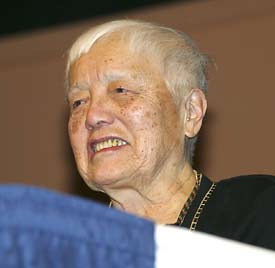Activist Grace Lee Boggs called on a cheering crowd of more than 1,100 to continue the University’s “courageous and righteous” battle for affirmative action during the keynote address of the symposium honoring Martin Luther King Jr.

The 87-year-old Boggs, the daughter of Chinese immigrants, earned a bachelor’s degree from Barnard College in 1935 and a Ph.D. from Bryn Mawr College in 1940. Discrimination kept her from being hired as a professor. She married UAW activist James Boggs, settled in Detroit and began a lifetime career as a social activist.
“Rebellions are important but fall short of revolution because people at the grass roots are not involved, which is why we had to go beyond protest politics,” Boggs told the capacity crowd at Rackham Auditorium in an event sponsored by the MLK Symposium Planning Committee.
President Mary Sue Coleman, appearing with Boggs, told the crowd the case before the Supreme Court of the United States, which deals with the constitutionality of U-M’s affirmative action policies, is “a great struggle we are in, defending ourselves.”
“I believe we will win,” Coleman said. “The University of Michigan has an unwavering commitment to diversity.”
Responding to critics who say affirmative action places a stigma on recipients who are considered less qualified by peers not given the preference, Coleman said U-M’s minority graduation rates were the highest of any four-year school in the state and above the national average.
She also stressed the admission policy’s heavy reliance on academic achievement beyond all other factors, telling the students, “If you are here, it is because you are highly qualified.”
Boggs, while noting that both sides of the affirmative action debate quote King’s words to bolster their own arguments, praised the University’s stand and said Americans could honor King by supporting the University and by opposing a U.S. war against Iraq for the same reasons King opposed the war in Vietnam.
Boggs noted that King spent just 13 years as a civil rights activist before he was assassinated in 1968, but she said King was inspired by and “stood on the shoulders of” what had been accomplished before him by Mahatma Gandhi. She said we all stand on King’s shoulders, carrying on what he began.
“We are building on the legacy of Gandhi and King, and we must renew our commitment to the earth and to each other,” Boggs said. “It’s about creating a higher humanity, not higher buildings.”
Boggs, who organized Detroit Summer more than a decade ago, spearheads programs that bring Detroit’s neighborhoods together for projects such as establishing community gardens, improving education and creating massive murals of artwork. The Boggs Center is part of an effort to rebuild Detroit’s Chinatown neighborhood, showing Detroit race relations “is about more than just Black and white,” she said.
She cited King’s “freedom schools” in the 1960s, which inspired young people and then their parents to take to the streets protesting the lack of civil rights until the reaction to the protests galvanized public opinion, forcing politicians to change the laws. Similarly, she said future changes must come from the community level.
“We need to organize our communities with the same audacity used to organize our civil rights movement,” Boggs said. “We need to give our children a better reason to study than just to get a job.”
More MLK stories
Boggs: Affirmative action fight is ‘righteous’>
Athletics cuts ‘not all Title IX’s fault’>
Country isn’t free of racism and discrimination>
CoE kicks off yearlong series of MLK events>
More minorities needed in math fields>
Sarri discusses reasons for plight of poor women>
Gomes: ‘You are on the side of the future’>
Rajmohan Gandhi discusses legacies of his grandfather, King>
Poets address peace, racism and politics>
A day for children>

